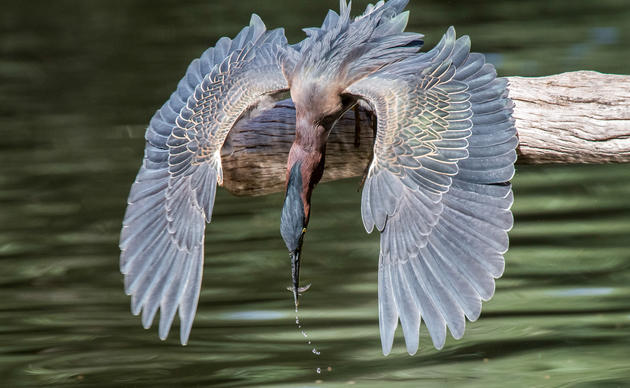CHARLESTON, South Carolina (Feb. 4, 2020) — Audubon South Carolina protects birds and the places they need in our state through science-based research and conservation, education and outreach, and issues advocacy. Regarding the organization’s 2020 legislative and conservation priorities, Audubon South Carolina Executive Director Justin Stokes shared the following statement:
“Audubon South Carolina’s 2020 policy agenda aims to address the most pressing threats to our birds, with a focus on pragmatic solutions that engender strong bipartisan support for conservation. Our efforts include advancing landscape-scale conservation of some of South Carolina’s most ecologically important landscapes, defending critical environmental laws, expanding market access to renewable energy technologies, and securing state and federal funding to support our conservation priorities in the Palmetto state.”
Audubon’s 2020 priorities include:
Securing a clean energy future for South Carolina
Last year Audubon South Carolina supported the successful passage of the South Carolina Energy Freedom Act, which aimed to make renewable energy more competitive and cost-effective for energy consumers, ratepayers and businesses across the state. Audubon South Carolina will continue to support the rapid growth of renewable energy markets in the state by encouraging effective implementation of the Energy Freedom Act, advocating for the transition of state-owned electric utility Santee Cooper to 100 percent clean energy sources by 2050, and supporting any legislation that aims to increase access to residential and/or commercial solar.
Promoting resilience in flood-prone areas
Audubon South Carolina supports passage of the South Carolina Resilience Revolving Fund Act, which would create a low-interest revolving loan fund to help communities finance the voluntary purchase of properties that experience repetitive flooding. In the recent wake of dramatic flooding events and increasingly devastating storms, this innovative bill would help victims of repetitive flooding to relocate out of harm’s way and ensure the restoration of those properties back to a natural state thus creating a more efficient ecosystem while creating critical bird and wildlife habitat. If passed, the revolving loan fund would be the first of its kind in the country, and would serve as a model for other states seeking innovative and proactive solutions to extreme weather events.
Bolstering funding for the Conservation Bank
Audubon South Carolina has been a strong advocate for the Conservation Bank and a recipient of its funds, which have supported the permanent protection of Audubon’s Silver Bluff Sanctuary in Aiken County and strategic land protection and acquisition as part of Audubon’s Beidler Forest Center and Sanctuary. Each year demand for support from the Conservation Bank exceeds its available funds, and timelines for other funding sources do not always align with the state budget cycle. Audubon South Carolina supports increased funding for the Conservation Bank and added flexibility to carry forward funds for select projects as necessary.
Preventing offshore drilling and seismic testing
With a groundswell of support from every coastal community in South Carolina and hundreds more up and down the east coast, offshore drilling in the Atlantic Ocean was taken off the table in 2016. Unfortunately, the threat of drilling reappeared in 2017 with additional harmful decisions expected in the upcoming months. Audubon South Carolina opposes any plans for exploration and drilling off our coast, including seismic testing, which would put South Carolina’s birds and marine life, quality of life and lucrative tourism economy at risk. That is why we support S.870 and H.3087, bills that would severely restrict the ability of oil interests to set up on-shore infrastructure in our state in support of off-shore oil and gas exploration and drilling.
Promoting common-sense environmental regulations
Audubon South Carolina will continue monitoring a broader set of conservation issues in the South Carolina General Assembly including support for commonsense regulatory measures that protect our state’s environment, full funding and implementation of the State Water Plan, and allowing local municipalities to regulate the use of plastic bags and other single-use containers.
###
About Audubon South Carolina
Audubon South Carolina protects birds and the places they need, right here in South Carolina. We’re the state office of the National Audubon Society, which has more than one million members and a century-long track record of success. In South Carolina, we represent more than 20,000 Audubon members and supporters, nine Audubon chapters and bird club partners, two Audubon centers and 22,000 acres of land that we own and manage. Learn more about what we do and how to help at sc.audubon.org. Follow us on Facebook at @ScAudubon, Twitter at @AudubonSc, and Instagram at @audubon_sc.
About National Audubon Society
The National Audubon Society protects birds and the places they need, today and tomorrow, throughout the Americas using science, advocacy, education and on-the-ground conservation. Audubon’s state programs, nature centers, chapters and partners have an unparalleled wingspan that reaches millions of people each year to inform, inspire and unite diverse communities in conservation action. Since 1905, Audubon’s vision has been a world in which people and wildlife thrive. Audubon is a nonprofit conservation organization. Learn more at www.audubon.org and @audubonsociety.
MEDIA CONTACT:
Sarah McKenna
561.632.8457
smckenna@audubon.org



